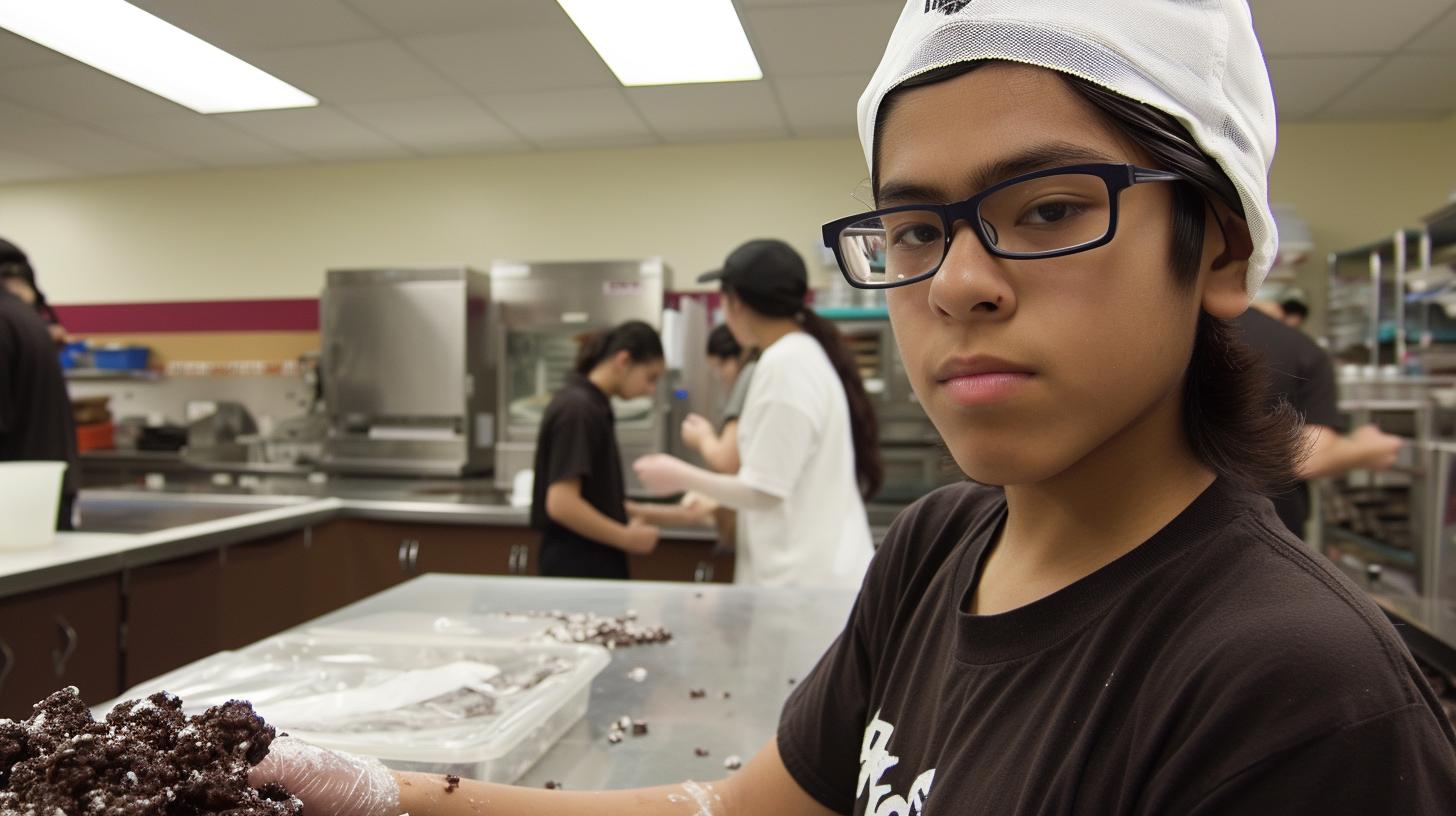Success for students can be achieved through a tried and tested recipe that incorporates various essential ingredients. From setting goals to embracing failure, there are numerous components that contribute to the overall success of a student. This article will explore the different facets of this recipe for success, providing valuable insights and strategies to help students thrive in their academic journey.
Setting clear and achievable goals is the cornerstone of success for students. By having a roadmap outlining their ambitions and aspirations, students can stay focused and motivated to achieve their desired outcomes. Time management also plays a crucial role in the equation, as it enables students to balance their academic responsibilities with work and personal life.
In addition, developing effective study habits is essential for optimal learning and retention of information. Overcoming challenges such as stress and obstacles is also a critical skill that students must master in order to navigate through the ups and downs of academic life.
Furthermore, seeking support from resources and building a strong support system can provide the necessary encouragement and guidance needed for success. Building confidence, leveraging connections through networking, embracing failure as a learning opportunity, and celebrating achievements are all vital elements that contribute to the overall recipe for success for students.
In this article, we will delve into each of these components in detail, offering practical tips and strategies to help students cultivate these skills. By understanding what defines success for students and incorporating these key ingredients into their lives, they can pave the way for a fulfilling academic journey filled with accomplishments and growth.
Setting Goals
One key benefit of setting goals is that it helps students stay focused and organized. By outlining what they want to accomplish within a designated timeframe, students can prioritize tasks and allocate their time and resources effectively. This not only enhances productivity but also reduces stress and anxiety associated with feeling overwhelmed by competing demands.
In addition to providing direction and focus, setting goals also serves as a source of accountability. When students have clearly defined objectives, they are more likely to monitor their progress and take ownership of their actions. By regularly evaluating their advancements in relation to their goals, students can make adjustments as needed and track their growth over time.
Furthermore, setting goals fosters a sense of purpose and fulfillment. As students work towards achieving their objectives, they experience a sense of accomplishment when each milestone is reached. This instills confidence in their abilities and encourages continued efforts towards future aspirations.
According to a study published by the American Psychological Association (APA), goal-setting is linked to higher levels of achievement and overall well-being. Researchers found that individuals who set specific, challenging goals performed better than those who had vague or no objectives. This highlights the significance of goal-setting in academic success and personal development.
| Benefit | Data |
|---|---|
| Direction & Focus | Students can prioritize tasks effectively |
| Accountability | More likely to monitor progress towards goals |
| Purpose & Fulfillment | Students experience a sense of accomplishment |
Time Management
Setting Priorities
One key aspect of time management is setting priorities. Students need to identify what tasks are most important and allocate their time and energy accordingly. This may involve making tough decisions about which activities take precedence over others.
Creating a Schedule
Another essential time management strategy is creating a schedule that allows for dedicated time for studying, attending classes, working, and personal activities. By having a schedule in place, students can ensure that they are making the most of their time and not missing out on any important commitments.
Avoiding Procrastination
Procrastination can be a major obstacle to effective time management. Students should develop strategies to avoid putting off tasks until the last minute, such as breaking larger projects into smaller manageable steps or using tools like timers or task lists to stay on track.
Seeking Work-Life-School Balance
Finding balance between school, work, and personal life is crucial for overall well-being. It’s important for students to carve out time for relaxation, hobbies, and socializing in addition to academic and professional pursuits. A healthy work-life-school balance can contribute to reduced stress levels and increased productivity.

Adapting as Needed
Lastly, effective time management also involves being adaptable. Students should be open to adjusting their schedules or study habits as necessary in response to unexpected changes or challenges that may arise.
Study Habits
Effective study habits are essential for students to succeed in their academic endeavors. Developing a recipe for success for students begins with the implementation of solid study strategies. One key element of an effective study habit is organization. Keeping track of assignments, deadlines, and important dates helps students stay on top of their workload and reduces the likelihood of feeling overwhelmed.
Another crucial aspect of successful studying is creating a conducive environment for learning. This means finding a quiet and comfortable space where distractions are minimized, allowing for better focus and concentration. Additionally, integrating active learning techniques such as summarizing material, teaching concepts to others, and frequent self-quizzing can enhance retention and understanding.
In addition to organization and environment, time management plays a significant role in effective study habits. Creating a schedule that allows for dedicated study time while also prioritizing self-care and leisure is crucial for maintaining balance. Setting specific goals during study sessions can help break down large tasks into manageable chunks, making the workload seem more achievable.
It’s also important for students to engage critically with the material by practicing different methods of learning such as visual aids, mnemonic devices, or group discussions. Varying study methods can stimulate cognitive function and create more robust neural connections which ultimately leads to better retention.
Lastly, seeking feedback from professors or mentors about one’s study habits can provide valuable insight into potential areas for improvement. With the right strategies in place, students can optimize their learning potential and set themselves up for academic success.
Overcoming Challenges
Recognizing Stress and Obstacles
One of the key challenges that students face on their journey to success is dealing with stress and overcoming obstacles. Whether it’s academic pressure, personal challenges, or unexpected hurdles, it’s important for students to recognize these stressors and obstacles as potential roadblocks to their success. By acknowledging these challenges, students can then take the necessary steps to address them and find ways to overcome them.
Developing Coping Mechanisms
In order to effectively deal with the stress and obstacles that come their way, students need to develop coping mechanisms that work for them. This could involve practicing mindfulness and relaxation techniques, seeking support from friends, mentors, or counselors, or engaging in activities that bring joy and positivity into their lives. By developing healthy coping mechanisms, students can better manage their stress levels and navigate through obstacles with resilience.
Setting Realistic Expectations
Another important aspect of overcoming challenges is setting realistic expectations for oneself. It’s natural for students to face setbacks and encounter difficulties along the way, but it’s essential for them to understand that perfection is not the goal. By setting realistic expectations and understanding that failure is a part of the learning process, students can approach challenges with a growth mindset and be more equipped to overcome them.
Seeking Help When Needed
When facing overwhelming stress or particularly difficult obstacles, it’s crucial for students to seek help when needed. Whether it’s reaching out to professors for academic support, seeking guidance from counselors or mental health professionals for personal challenges, or asking for assistance from peers or mentors, recognizing when help is necessary can make a significant difference in overcoming obstacles.
Promoting Self-Care
Finally, promoting self-care is essential in the recipe for success for students when it comes to overcoming challenges. Taking care of one’s physical, mental, and emotional well-being is crucial in managing stress and navigating through obstacles. This could involve getting enough sleep, eating well-balanced meals, exercising regularly, engaging in hobbies or activities that bring joy – all of which contribute to a student’s overall ability to cope with challenges effectively.

Seeking Support
When it comes to the recipe for success for students, seeking support is an essential ingredient. No student can thrive in isolation, and utilizing available resources and building a support system can make a significant difference in their academic journey. Whether it’s seeking help from teachers, connecting with peers, or using campus resources, having a strong support system can contribute to a student’s success.
Here are some ways that students can seek support and utilize resources to build a solid support system:
- Join study groups: Forming or joining study groups with classmates can provide an opportunity for collaboration, sharing of knowledge, and mutual support.
- Visit the campus tutoring center: Many schools offer tutoring services to assist students with challenging subjects or assignments. Taking advantage of these services can help students improve their understanding and performance.
- Seek mentorship: Finding a mentor, whether it’s a teacher, advisor, or older student, can provide valuable guidance and advice throughout the academic journey.
- Utilize counseling services: Dealing with the pressures of school and life can be overwhelming at times. Many campuses offer counseling services to help students manage stress and personal challenges.
- Connect with alumni networks: Building connections with alumni who have successfully navigated the academic journey can provide valuable insights, advice, and potential opportunities for internships or jobs.
In addition to utilizing resources available on campus, building a support system outside of school is equally important. Family members, friends, and even online communities can offer encouragement, advice, and emotional support during challenging times.
Overall, seeking support by utilizing available resources and building a strong support system is crucial for the success of students. Whether it’s academic assistance, emotional support, or career guidance – having a network of people who believe in their potential can empower students to overcome obstacles and reach their full potential.
Building Confidence
- Positive Self-talk: Encouraging positive self-talk is essential in fostering confidence. Students should practice affirming themselves and challenging negative thoughts that may hinder their progress.
- Setting Realistic Expectations: It’s important for students to set realistic expectations for themselves, acknowledging their strengths while also being mindful of areas for improvement. By setting achievable goals, students can build confidence as they make progress.
- Embracing Challenges: Encouraging students to embrace challenges as opportunities for growth and learning can help in building their confidence. When students develop a mindset that reframes obstacles as stepping stones to success, they become more resilient and self-assured.
- Seeking Feedback: Actively seeking feedback from peers, teachers, and mentors can provide valuable insights for personal and academic growth. By incorporating constructive criticism into their learning process, students can continue to improve while boosting their confidence.
- Practicing Self-care: Building confidence also involves taking care of one’s physical, mental, and emotional well-being. Students should prioritize self-care activities such as exercise, mindfulness practices, spending time with loved ones, or pursuing hobbies that bring them joy.
By incorporating these strategies into their daily lives, students can gradually enhance their confidence levels and develop a positive mindset that fuels their journey towards success. Building confidence is an ongoing process that requires patience and perseverance but yields substantial rewards in the form of resilience, determination, and self-assurance on the path to achieving academic and personal goals.
Networking
One key aspect of networking for students is leveraging connections within their academic community. This may include building relationships with professors who can offer guidance on coursework, research opportunities, or career advice. Additionally, connecting with fellow classmates allows students to form study groups, share resources, and provide support during challenging times. Building meaningful connections within the academic setting not only enhances the learning experience but also opens doors for future collaborations and opportunities.

Beyond the campus walls, students can benefit from expanding their network to include professionals in their field of interest. This may involve attending career fairs, industry events, or informational interviews with individuals working in desired industries. By actively seeking out these opportunities to connect with professionals, students can gain valuable insights into potential career paths, learn about internship or job openings, and even secure mentorship from experienced individuals who are willing to guide them along their journey.
In today’s digital age, networking has become more accessible through social media platforms such as LinkedIn. Creating a professional online presence allows students to showcase their skills and experiences while also connecting with alumni from their institution or professionals in their field. Engaging in online networking opens up new avenues for learning about industry trends, accessing job postings, and even receiving advice from seasoned professionals – all of which contribute to a student’s recipe for success.
As students engage in networking efforts both within the academic setting and beyond, it is important that they approach these interactions with authenticity and a willingness to give back. Networking is not simply about what one can gain from others; it is also about how one can contribute value to the network as well.
By offering support or sharing knowledge with others in their network, students not only strengthen existing connections but also build a positive reputation within their chosen field – an essential ingredient in the recipe for success for students.
Embracing Failure
In the journey towards success, it is essential for students to understand that failure is not the end, but rather an opportunity for growth. Embracing failure and learning from setbacks is a fundamental part of the recipe for success for students. When students shift their mindset to view failure as a stepping stone instead of a stumbling block, they develop resilience and the ability to bounce back from challenges.
One key component of embracing failure is understanding that making mistakes is a natural part of the learning process. When students acknowledge their mistakes and take responsibility for them, they open themselves up to valuable lessons that can help them improve and succeed in the future. By learning from their failures, students can develop problem-solving skills and adaptability, which are crucial traits for achieving success.
Moreover, embracing failure involves reframing one’s perspective on setbacks. Instead of seeing failure as a reflection of their abilities or worth, students should view it as an opportunity to reassess strategies, set new goals, and keep moving forward. This shift in perspective allows students to approach challenges with optimism and determination, ultimately contributing to their overall growth and development.
Another important aspect of embracing failure is being open to seeking feedback and guidance from others. By seeking input from teachers, mentors, or peers, students can gain valuable insights into how they can improve and overcome obstacles. Additionally, connecting with others who have experienced similar setbacks can provide a sense of support and encouragement, reminding students that they are not alone in their journey towards success.
Celebrating Achievements
In conclusion, the recipe for success for students is a multi-faceted approach that encompasses setting goals, managing time effectively, developing study habits, overcoming challenges, seeking support, building confidence, networking, embracing failure, and celebrating achievements. Each of these elements plays a crucial role in the journey towards success in academics and beyond.
Setting goals is the essential first step in the recipe for success. By defining what they want to achieve and creating a roadmap to get there, students can stay focused and motivated throughout their academic endeavors. Time management is equally important as it allows students to balance their schoolwork with other responsibilities and activities.
Developing effective study habits not only improves academic performance but also instills discipline and perseverance. Overcoming challenges and seeking support are also critical components in this recipe for success. By learning to navigate obstacles and leaning on others when needed, students can ensure they don’t lose sight of their goals.
Building confidence and positive mindset are indispensable ingredients in the recipe for success. Students who believe in themselves are better equipped to face challenges head-on and strive towards their aspirations. Networking and building relationships can also open doors to new opportunities and resources for personal growth.
Embracing failure is an often overlooked but essential part of the recipe for success. By viewing setbacks as learning experiences rather than defeats, students can develop resilience and learn valuable lessons that will serve them well in their future endeavors. Lastly, celebrating achievements along the way helps students maintain a sense of accomplishment and motivation as they progress towards their ultimate goals.

